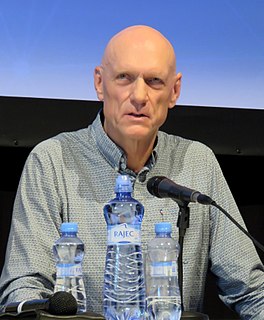A Quote by Rachel Cohn
The humans create life, and senselessly cause death. For nothing.
Related Quotes
We are left with nothing but death, the irreducible fact of our own mortality. Death after a long illness we can accept with resignation. Even accidental death we can ascribe to fate. But for a man to die of no apparent cause, for a man to die simply because he is a man, brings us so close to the invisible boundary between life and death that we no longer know which side we are on. Life becomes death, and it is as if this death has owned this life all along. Death without warning. Which is to say: life stops. And it can stop at any moment.
I now believe that evolution, or deevolution, never ends short of death, that no society has ever achieved an absolute pinnacle, that all humans are not created equal. In fact, I believe attempts to create some abstract equalization create a morass of injustices that rebound on the equalizers. Equal justice and equal opportunity are ideals we should seek, but we should recognize that humans administer the ideals and that humans do not have equal ability.
The woe of mortality makes humans God-like. It is because we know that we must die that we are so busy making life. It is because we are aware of mortality that we preserve the past and create the future. Mortality is ours without asking--but immortality is something we must build ourselves. Immortality is not a mere absence of death; it is defiance and denial of death. It is 'meaningful' only because there is death, that implacable reality which is to be defied.
So the main question is not, Which humans brought about the death of Jesus but, What did the death of Jesus bring about for humans - including Jews and Muslims and Buddhists and Hindus and nonreligious secularists - and all people everywhere?When it is all said and done, the most crucial question is: Why? Why did Christ suffer and die? Not why in the sense of cause, but why in the sense of purpose?
If you start parsing the cause-and-effect chain backward through time, eventually you land in cosmology - does the story begin with the Big Bang or the out-of-nothing creation of the world by the word of a Southern Baptist god? And that question is even more fraught than any of the others. The stakes couldn't be any higher, because not it's not just a question of life and death, but also a question of life after death or eternal torture after death.
Accustom yourself to believe that death is nothing to us, for good and evil imply awareness, and death is the privation of all awareness; therefore a right understanding that death is nothing to us makes the mortality of life enjoyable, not by adding to life an unlimited time, but by taking away the yearning after immortality. For life has no terror; for those who thoroughly apprehend that there are no terrors for them in ceasing to live.
Birth leads to death, death precedes birth. So if you want to see life as it really is, it is rounded on both the sides by death. Death is the beginning and death is again the end, and life is just the illusion in between. You feel alive between two deaths; the passage joining one death to another you call life. Buddha says this is not life. This life is dukkha - misery. This life is death.
The greatest mystery in life is not life itself, but death. Death is the culmination of life, the ultimate blossoming of life. In death the whole life is summed up, in death you arrive. Life is a pilgrimage towards death. From the very beginning, death is coming. From the moment of birth, death has started coming towards you, you have started moving towards death.
Everybody is afraid of death for the simple reason that we have not tasted of life yet. The man who knows what life is, is never afraid of death; he welcomes death. Whenever death comes he hugs death, he embraces death, he welcomes death, he receives death as a guest. To the man who has not known what life is, death is an enemy; and to the man who knows what life is, death is the ultimate crescendo of life.
Evolution does not attempt to explain the origin of life. It is simply a history of the process of life. With the secret cause of life evolution has nothing to do. A man, therefore, may be a materialistic evolutionist or a theistic evolutionist; that is, he may believe that the cause is some single unintelligent impersonal force, or he may believe that the cause is a wise and beneficent God.
The religious man, the mystic, tries to explore the mystery of death. In exploring the mystery of death, he inevitably comes to know what life is, what love is. Those are not his goals. His goal is to penetrate death, because there seems to be nothing more mysterious than death. Love has some mystery because of death, and life also has some mystery because of death.































